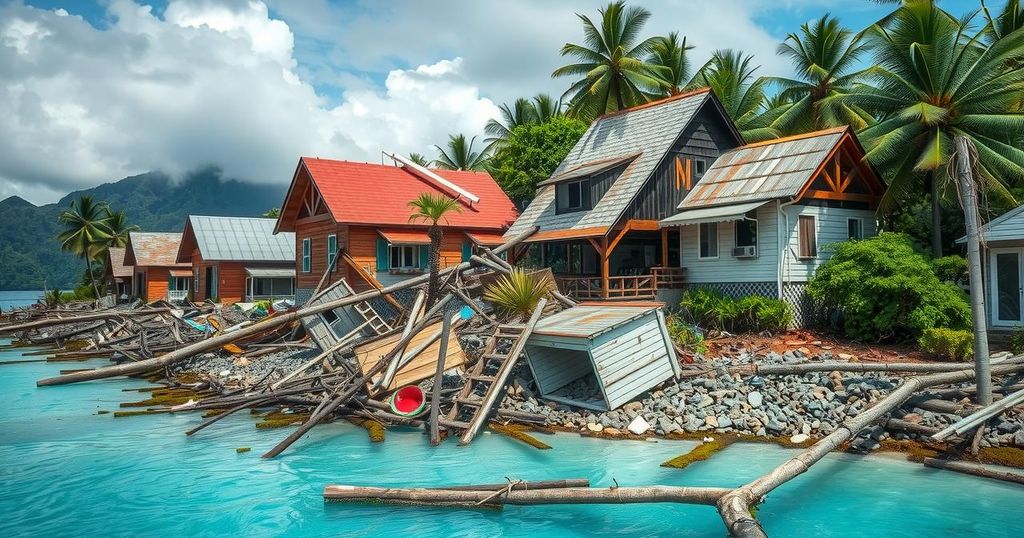Devastating Impacts of Cyclone Chido and Vanuatu Earthquake on Human Health
Tropical Cyclone Chido has caused widespread devastation in Mayotte, Comoros, and Mozambique, resulting in significant casualties and damage to infrastructure. Following this, a powerful earthquake struck Vanuatu, compounding the crisis. Direct Relief is actively assessing needs and providing emergency medical support in both regions, addressing immediate healthcare challenges and preparing for long-term recovery efforts amid the threats posed by these disasters.
Over the weekend, Tropical Cyclone Chido inflicted profound devastation across Mayotte, Comoros, and Mozambique, leading to significant loss of life and destruction. This storm, deemed the most powerful to hit Mayotte in over nine decades, produced wind gusts over 140 miles per hour and severe storm surges, fundamentally reshaping entire neighborhoods, particularly in informal settlements. Although officials have confirmed 22 fatalities, early estimates suggest that the casualty numbers may reach into the thousands as further evaluations are conducted.
The cyclone’s impact extended to neighboring Comoros where the government, led by President Azali Assoumani, declared a week of mourning in response to the widespread infrastructure damage and devastation across the island nation. Mozambique also bore the brunt of Cyclone Chido’s force as it made landfall, causing destruction to homes and healthcare facilities in the Cabo Delgado province due to exceptionally high winds and torrential rainfall.
In the immediate aftermath of these disasters, Direct Relief has mobilized to assess and address the needs of affected communities. In Mayotte, the organization is aligning efforts with French emergency agencies to provide essential healthcare services while partnering with Santé Diabète in Comoros to facilitate ongoing assessments and support. Coordination with Mozambique’s Ministry of Health is also underway to deliver emergency medical supplies and logistical support as damage assessments are finalized.
In a further disaster, a 7.3-magnitude earthquake struck Vanuatu, causing extensive damage to homes and public infrastructure, with ongoing aftershocks creating additional challenges for recovery efforts. Direct Relief is engaged in coordinating needed assistance in Vanuatu by working closely with healthcare partners to identify urgent medical needs, including a shipment of emergency medical supplies currently on its way to the region.
The intersection of these disasters highlights significant threats to human health. Natural calamities like cyclones and earthquakes result in not only immediate injuries but also long-term public health challenges. Natural flooding often contaminates water supplies, leading to outbreaks of diseases such as cholera and malaria. Displacement caused by destruction of homes forces survivors into crowded shelters, exacerbating the risk of communicable diseases. Access to care for chronic conditions is frequently interrupted, while pregnant women face heightened risks due to disruption of maternal health services.
Direct Relief continues to play a crucial role by preemptively positioning medical supplies and collaborating with local healthcare providers to ensure that communities receive timely medical assistance during emergencies. With a commitment to disaster response, the organization has a history of delivering substantial medical aid in the wake of other catastrophic events, such as the earthquakes in Türkiye and Syria earlier this year, as well as past cyclones in Mozambique and the Philippines.
As the repercussions of Cyclone Chido and the earthquake in Vanuatu continue to unfold, Direct Relief remains steadfast in its mission to support healthcare providers and affected communities, ensuring that life-saving medical care reaches those in need.
The article reports on the recent calamities in the Indian Ocean region caused by Tropical Cyclone Chido and a significant earthquake in Vanuatu. Cyclone Chido has been described as one of the most powerful storms in decades, severely impacting vulnerable communities in Mayotte, the Comoros, and Mozambique. In the Pacific, the earthquake in Vanuatu compounds the risks already posed by natural disasters to human health, illustrating the need for emergency medical assistance. Direct Relief, a humanitarian organization, is actively responding to these crises, providing critical healthcare support and resources.
In summary, the catastrophic impacts of Tropical Cyclone Chido and the recent earthquake in Vanuatu underscore the urgent need for effective disaster response and public health measures. Direct Relief’s commitment to delivering essential medical supplies and support to affected areas highlights the intersection of humanitarian assistance and healthcare in times of crisis. Proactive engagement and collaboration with local healthcare systems are crucial in mitigating the long-term health consequences of such devastating events.
Original Source: www.directrelief.org




Post Comment